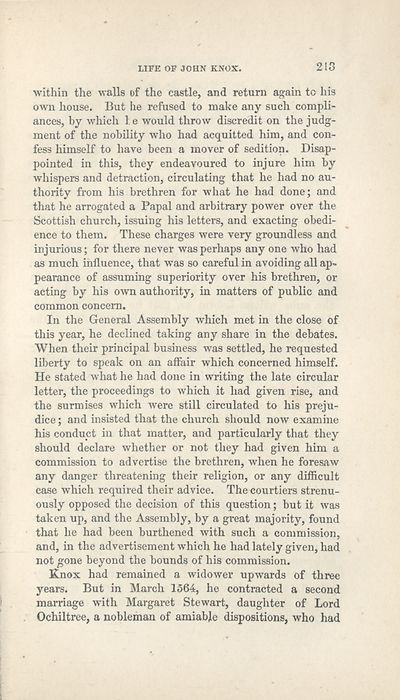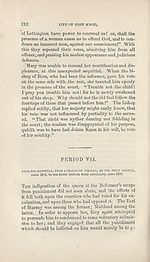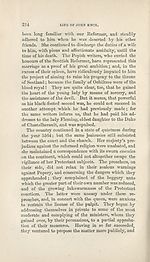Download files
Complete book:
Individual page:
Thumbnail gallery: Grid view | List view

LIFE OF JOHN KNOX.
213
within the walls of the castle, and return again to his
own house. But he refused to make any such compli¬
ances, by which 1. e would throw discredit on the judg¬
ment of the nobility who had acquitted him, and con¬
fess himself to have been a mover of sedition. Disap¬
pointed in this, they endeavoured to injure him by
whispers and detraction, circulating that he had no au¬
thority from his brethren for what he had done; and
that he arrogated a Papal and arbitrary power over the
Scottish church, issuing his letters, and exacting obedi¬
ence to them. These charges were very groundless and
injurious; for there never was perhaps any one who had
as much influence, that was so careful in avoiding all ap¬
pearance of assuming superiority over his brethren, or
acting by his own authority, in matters of public and
common concern.
In the General Assembly which met in the close of
this year, he declined taking any share in the debates.
When their principal business was settled, he requested
liberty to speak on an affair which concerned himself.
He stated what he had done in writing the late circular
letter, the proceedings to which it had given rise, and
the surmises which were still circulated to his preju¬
dice ; and insisted that the church should now examine
his conduct in that matter, and particularly that they
should declare whether or not they had given him a
commission to advertise the brethren, when he foresaw
any danger threatening their religion, or any difficult
case which required their advice. The courtiers strenu¬
ously opposed the decision of this question; but it was
taken up, and the Assembly, by a great majority, found
that he had been burthened with such a commission,
and, in the advertisement which he had lately given, had
not gone beyond the bounds of his commission.
Knox had remained a widower upwards of three
years. But in March 1564, he contracted a second
marriage with Margaret Stewart, daughter of Lord
Ochiltree, a nobleman of amiable dispositions, who had
213
within the walls of the castle, and return again to his
own house. But he refused to make any such compli¬
ances, by which 1. e would throw discredit on the judg¬
ment of the nobility who had acquitted him, and con¬
fess himself to have been a mover of sedition. Disap¬
pointed in this, they endeavoured to injure him by
whispers and detraction, circulating that he had no au¬
thority from his brethren for what he had done; and
that he arrogated a Papal and arbitrary power over the
Scottish church, issuing his letters, and exacting obedi¬
ence to them. These charges were very groundless and
injurious; for there never was perhaps any one who had
as much influence, that was so careful in avoiding all ap¬
pearance of assuming superiority over his brethren, or
acting by his own authority, in matters of public and
common concern.
In the General Assembly which met in the close of
this year, he declined taking any share in the debates.
When their principal business was settled, he requested
liberty to speak on an affair which concerned himself.
He stated what he had done in writing the late circular
letter, the proceedings to which it had given rise, and
the surmises which were still circulated to his preju¬
dice ; and insisted that the church should now examine
his conduct in that matter, and particularly that they
should declare whether or not they had given him a
commission to advertise the brethren, when he foresaw
any danger threatening their religion, or any difficult
case which required their advice. The courtiers strenu¬
ously opposed the decision of this question; but it was
taken up, and the Assembly, by a great majority, found
that he had been burthened with such a commission,
and, in the advertisement which he had lately given, had
not gone beyond the bounds of his commission.
Knox had remained a widower upwards of three
years. But in March 1564, he contracted a second
marriage with Margaret Stewart, daughter of Lord
Ochiltree, a nobleman of amiable dispositions, who had
Set display mode to:
![]() Universal Viewer |
Universal Viewer | ![]() Mirador |
Large image | Transcription
Mirador |
Large image | Transcription
| Antiquarian books of Scotland > Scotland/Scots > Life of John Knox ; and, The life of Alexander Henderson > (231) |
|---|
| Permanent URL | https://digital.nls.uk/131835076 |
|---|
| Description | Thousands of printed books from the Antiquarian Books of Scotland collection which dates from 1641 to the 1980s. The collection consists of 14,800 books which were published in Scotland or have a Scottish connection, e.g. through the author, printer or owner. Subjects covered include sport, education, diseases, adventure, occupations, Jacobites, politics and religion. Among the 29 languages represented are English, Gaelic, Italian, French, Russian and Swedish. |
|---|

